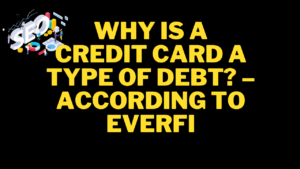Introduction:
Credit cards have become an integral part of modern-day financial transactions. Whether purchasing goods online, booking travel tickets, or paying for everyday expenses, credit cards offer convenience and flexibility like no other form of payment. However, with the myriad of options available and the potential pitfalls associated with their misuse, understanding credit cards is crucial for financial well-being. This comprehensive guide will delve into the world of credit cards, covering everything from their basics to advanced strategies for responsible usage.
Understanding Credit Cards:
At its core, a credit card is a financial tool that allows users to borrow money from a financial institution up to a predetermined limit. Unlike debit cards, which deduct funds directly from a linked bank account, credit cards provide a line of credit that must be repaid within a specified period, usually every month. This borrowed amount incurs interest if not paid in full by the due date.
Types of Credit Cards:
Credit cards come in various types, each catering to different needs and lifestyles. Some common types include:
Rewards Credit Cards: These cards offer rewards, such as cashback, travel miles, or points, based on the amount spent using the card.
Balance Transfer Credit Cards: Designed to help users consolidate debt, these cards allow to transfer balances from other credit cards at lower interest rates.
Secured Credit Cards: Geared towards individuals with limited or poor credit history, secured credit cards require a security deposit, which serves as collateral.
Business Credit Cards: Specifically tailored for business expenses, these cards offer perks such as higher credit limits and rewards on business-related purchases.
Key Features and Terms:
To make informed decisions about credit cards, it’s essential to understand their key features and associated terms. These may include:
Annual Percentage Rate (APR): The annualized interest rate charged on outstanding balances.
Credit Limit: The maximum amount a cardholder can borrow on a credit card.
Minimum Payment: The lowest amount a cardholder must pay monthly to maintain the account in good standing.
Grace Period: No interest is charged on purchases if the balance is paid in full by the due date.
Fees: Various fees may apply, including annual fees, late payment fees, and foreign transaction fees.
Benefits of Using Credit Cards:
When used responsibly, credit cards offer several advantages, including:
Convenience: Credit cards are convenient, especially for online and in-person transactions.
Rewards: Many credit cards offer rewards such as cashback, travel miles, or points, providing additional value for cardholders.
Build Credit History: Responsible credit card usage can help individuals build a positive credit history, which is crucial for future loan approvals.
Purchase Protection: Some credit cards offer purchase protection, including extended warranties and fraud protection, providing peace of mind to cardholders.
Managing Credit Card Debt:
While credit cards offer numerous benefits, they can also lead to debt if not managed responsibly. To avoid falling into debt traps, consider the following strategies:
Pay in Full: Whenever possible, pay the credit card balance in full each month to avoid accruing interest charges.
Monitor Spending: Keep track of your spending and stay within your budget to avoid overspending.
Avoid Minimum Payments: While minimum payments may seem convenient, they can lead to long-term debt due to accruing interest.
Utilize Rewards Wisely: Make the most of credit card rewards but avoid overspending solely to earn rewards.
Credit cards are powerful financial tools that offer convenience, flexibility, and rewards when used responsibly. By understanding their features, terms, and potential pitfalls, individuals can make informed decisions and harness the benefits of credit cards while avoiding common pitfalls such as debt accumulation. With proper management and responsible usage, credit cards can serve as valuable assets in achieving financial goals and enhancing overall economic well-being.
Ever wondered why using a credit card feels different from simply paying with cash? While both methods allow you to purchase things, there’s a key difference: credit cards involve debt. But why exactly is that? Let’s dive in and see what Everfi has to say about it.
Why is a Credit Card a Type of Debt?

Credit Card is a Type of Debt Because it grants you “borrowed power,” letting you buy now and pay later. This means you can make purchases even if you don’t have the funds available in your bank account at the moment. Consider it as a loan from the card company, with interest as the price tag.
Key Points that Credit Card is a Type of Debt:
- Credit cards allow you to borrow money to make purchases, unlike cash.
- This borrowing comes with a small fee called interest.
- Using your credit card adds to your debt if not paid back promptly.
- Responsible credit card usage involves paying your balance in full each month.
Fee Structure:
Now, this borrowing power doesn’t come entirely free. Credit card companies typically charge a small fee, known as interest, for the money you borrow. This fee is calculated based on the outstanding balance you carry on your card each month. So, the longer you take to pay back what you borrow, the more interest you accrue, increasing your overall debt.
Hidden Ways Your Credit Card Can Grow Debt
While you might often think of using credit cards at stores, their reach extends further. You can also use them for online purchases, bill payments, and even cash advances, all of which add to your debt if not managed responsibly.
Responsible Borrowing is Key:
Using a credit card can be a valuable tool for building credit and managing finances effectively. However, it’s crucial to remember that it’s borrowing money, not free spending. Always strive to pay off your balance in full each month to avoid accumulating debt and interest charges.
Conclusion:
By understanding these core principles, you can leverage the power of credit cards responsibly and navigate them as a valuable financial tool, not a burden of debt.

